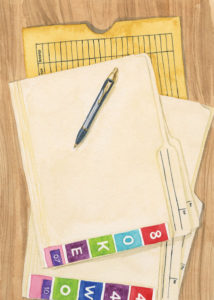A Delicate Matter in the Examination Room
Unlike most refugees, I wasn’t scared when I came to this country from Ethiopia many years ago. I was confused. But early on, I understood that the first thing you need to do is survive. After a couple of months in Buffalo, I moved to Houston. For three years, I worked as a waitress and did odd jobs, and then I began volunteering at a refugee center in Hillcroft, one of the most crowded places in the city, filled with social-service organizations, apartments and grocery stores and restaurants that sell food from around the world. The refugee center hired me as its program manager, and I received formal training from the state to do medical interpretation.
One morning, I was occupied with a client from Congo who was pregnant and was having difficulty getting through the application process for Medicaid. Just then, the receptionist buzzed me. A local doctor, Dr.R., was on the line. “I need a favor,” he said. “I have this Amharic-speaking gentleman. He has limited English. Can you come now to help with interpretation?”
I told Dr.R. that I could be free in 30 minutes. When I was sure my client understood what she had to do, I let her go and walked to his office three buildings away. (The Hillcroft area is one of the few places in Houston where you see people walking. That’s because many people there don’t have cars.) Once I reached Dr.R.’s clinic, he appeared almost immediately, in his lab coat and stethoscope. He looked relieved to see me.
I followed him into the examination room, where the patient sat on a chair. An older man with gray hair, he appeared to be in his late 60s and seemed quite fit — perhaps he was a farmer in Ethiopia. He greeted me with a smile, making me feel as if I were the girl next door.
The best situation would have been for a man to translate for the gentleman, but that option was not available. Ethiopians are more reserved than Americans, especially when we talk to older people; we have to be careful, and we do not make direct eye contact. Talking in Amharic, I introduced myself to him and told him about the confidentiality of our conversation. I then turned to Dr.R. and repeated the confidentiality statements to him, even though I had interpreted for him many times before. After all, that was my training. I also added (as I always did): “If I don’t understand — sometimes medical terminology can be different — I will pause and ask for further explanation.”
Once the formalities were completed, Dr.R. turned to the patient to ask: “What brings you to my clinic today?”
I listened to the patient’s response and translated for Dr.R.: “He says that he has pain from his belly button to his throat.” After translating, I added: “I think he’s complaining of gastroenteritis.”
Dr.R. wrinkled his brow. “Azeb, darling,” he said, “I did not ask you to diagnose my patient. Just ask him what he’s feeling.”
The patient repeated that he felt pain from his belly button to his throat. I pointed to myself as I explained to Dr.R.
The doctor turned to his computer and opened the man’s chart. “I need to see his medical history.” He paused and said, “Could you ask him if his testicles hurt?”
Today I encounter awkward situations all the time, but then I was still fairly new to it, and I froze. My face was getting a flushing sensation. It’s not as if I didn’t know the Amharic word for “testicles,” but we use the word only as an insult, and my mind blocked it. I remained silent, feeling as if my brain had shut down.
Finally something came to my mind. “How are those two things between your legs?” I asked.
The patient took in what I said. As my words flowed through his mind, he started to laugh. He was laughing so much that he nearly fell out of his chair.
Dr.R. looked confused. “Are you going to kill my patient? What are you asking him?”
Now I had to say the Amharic sentence in English! So I translated the same question for Dr.R., and he began to laugh.
When he stopped laughing, he turned to me and said: “Now you can leave the room. Your job is done.”
I walked to my office feeling embarrassed. My mind was whirring, but I still couldn’t think of the actual Amharic word for “testicles.” I was back in my office when it finally came to me — kolet.
That afternoon, I kept asking myself if I should just stop doing interpretation. I never wanted to say a word like kolet to a senior gentleman from my country! In the end I decided to continue — and I’ve kept doing it to this day — with one change. I now ask doctors to share patient bios with me, so I can be better prepared.
